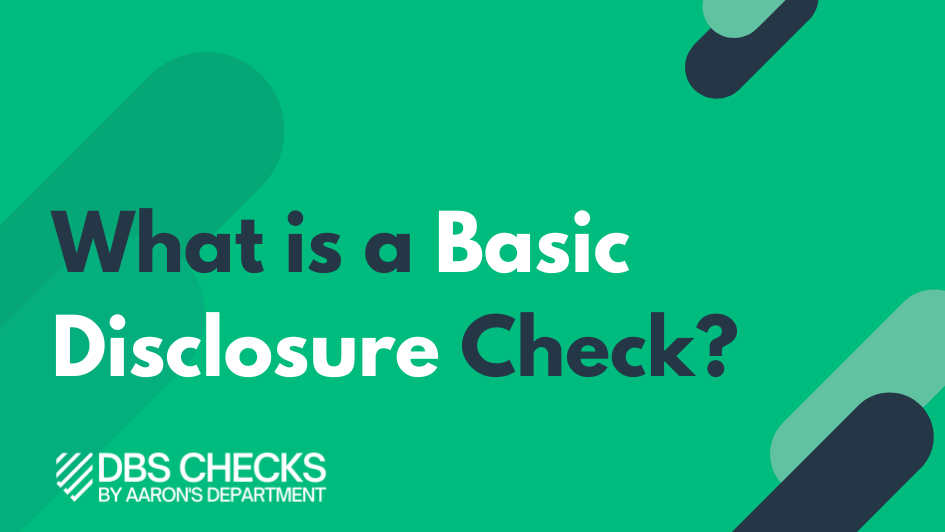What is a Basic Disclosure?
A Basic Disclosure is a criminal record check conducted by the Disclosure and Barring Service (DBS). It is used by employers, recruitment agencies, and other organisations to check the criminal records of potential employees or volunteers. It is often referred to as a ‘Basic DBS check’, or simply a ‘Basic check’.
A Basic Disclosure will show any unspent convictions, cautions, or reprimands that the person has on their record.
Table of Contents
What is a Basic Disclosure?
A Basic Disclosure is a criminal record check conducted by the Disclosure and Barring Service (DBS). It is used by employers, recruitment agencies, and other organisations to check the criminal records of potential employees or volunteers. It is often referred to as a ‘Basic DBS check’, or simply a ‘Basic check’.
A Basic Disclosure will show any unspent convictions, cautions, or reprimands that the person has on their record.


What Jobs Require a Basic Disclosure Check?
A Basic Disclosure check is not a legal requirement for any job; however, employers are within their rights to request one for prospective employees, and make employment decisions based on the results.
Employers tend to request Basic Disclosure checks in situations where themselves or their customers would benefit from peace-of-mind knowing that their employees have an acceptable criminal record. Who defines ‘acceptable’? That’s up to the employer.
An example we often see here at Aaron’s Department is Airlines requesting basic DBS checks for their staff, particularly baggage handlers. These workers will be left unsupervised with customers’ valuables, so it’s easy to see why employers wouldn’t want somebody with a recent history of theft working in such a role.
Employers can only make recruitment decisions based on unspent convictions – which are the only things revealed on a Basic disclosure check. Spent convictions are disclosed on Standard and Enhanced disclosures, but even then, employers must not let spent convictions influence their view of the candidate.
What Shows On A Basic DBS Check?
Basic Disclosures only reveal unspent convictions and cautions.
Quick explanation of Spent & Unspent
In order to give those with criminal records a fair chance at participating in society, less ‘severe’ offences, or offences committed while under 18 years of age will eventually become “spent”. Spent offences will not be disclosed on Basic DBS certificates, and cannot be taken into consideration when making employment decisions.
Any convictions or cautions that are not yet spent, are considered unspent by default These offences will appear on Basic Disclosures, and can be taken into consideration by employers.
For more information on spent and unspent convictions, have a read of our article:
The Difference Between Spent and Unspent Convictions
The Differences Between Basic, Standard, and Enhanced Disclosures
There are three different levels of DBS checks: Basic, Standard, and Enhanced. The level of check that is required will depend on the job role and the level of risk involved.
Basic Disclosure:
This level of check discloses the least information, and is never a legal requirement for employers. Basic checks disclose any unspent convictions, cautions, or reprimands that the applicant has on their record.
Standard Disclosure:
Standard certificates disclose all the applicant’s convictions, cautions, and reprimands, regardless of whether they are spent or unspent.
Enhanced Disclosure:
This is the most thorough level of DBS check. It will show all convictions, cautions, and reprimands, and if required, it will disclose whether the applicant is on the Barred Lists. There are two Barred Lists, containing the profiles of people who legally may not work with either/or/both children and Vulnerable Adults.
Take a look at our dedicated page on the Barred Lists for more info.
What Documents Are Needed For A Basic Disclosure Check?
The documents needed for a Basic DBS check depend on two things: which country the applicant is from, and what documents they have available.
Some of the more common documents used for DBS checks are:
– Passport
– UK Driving Licence
– UK Birth Certificate
– Bank Statement
– Utility bill
If you want to read more about the documents needed for any of the DBS Disclosure checks, we have written an Application Guide – What Do I Need For A DBS Check?
Who Has to Pay For a Basic Disclosure Check?
If you are applying for a job that requires a Basic Disclosure, there is a chance you may be asked to pay for it yourself, but this is uncommon.
Most of the time, the employer will take on the expense as an operating cost. After all, charging prospective employees for the pleasure of applying for a job hardly reflects well on the employer! If your employer is insisting that you pay, it is their call to make.


Summary – What is a Basic Disclosure
A Basic Disclosure is a simple criminal record check. They are a valuable tool for employers and recruitment agencies because they are affordable, available without any role-based restrictions, and give employers (and their customers) confidence in their staff.
Aaron’s Department
Aaron’s Department is a leading Umbrella Body – that is, a business that facilitates DBS checks for employers. We offer a fast and efficient service, and we can help you get the checks you need for your employees quickly and easily.
If you want to find out more about our services, we’re happy to take your call on +44 113 877 0171, or email us at contact@aaronsdepartment.com. We’re always happy to answer any questions you may have.
